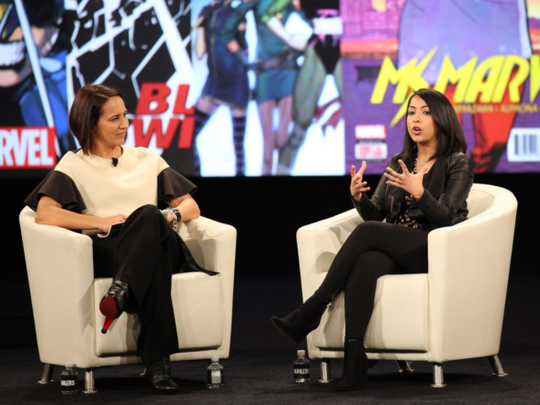
Behind every great woman is a legion of other women inspiring her.
For Sana Amanat, director of content and character development at Marvel and co-creator of Marvel’s first Muslim superhero, Ms Marvel, that includes her trailblazing mother and aunt.
Then unmarried, Amanat’s mum travelled from Pakistan to Beirut in the early 1960s. Still on her own, she travelled from Beirut to New York. Her mum has employed the term ‘meek’ to describe herself in those days, but Amanat sees another story.
“As a Muslim woman in 1964, that’s insane to me,” said Amanat, talking to Gulf News tabloid! at the Emirates Airline Festival of Literature last week. “She was truly independent.”
In fact, she still is. When President Donald Trump signed an executive order to stop travellers from seven Muslim majority countries from entering America earlier this year, dubbed by many a ‘Muslim ban’, Amanat posted a photo of her mother protesting. That spirit runs in her family. (“Mum’s older sister started the first all-female university in Jeddah, Dar Al Hekma,” said Amanat.)
Amanat’s parents attended university together and later married, becoming the kind of couple to host town halls together. They also started an Islamic centre in Boonton, New Jersey, 30 years ago. “It has now grown significantly. They’ve renovated. It’s a beautiful community centre,” said Amanat.
In a nut shell: Amanat’s mother is opinionated, sends her daughter ‘text poetry’ and has always told her never to depend on a man. “‘Make sure whatever you do, you get your own job, you make your own money.’ That’s what she did. She was making more money than my dad in the beginning,” said Amanat.
MS. MARVEL
Amanat took her mother’s advice and ran with it. Most famously, she co-created young superhero Kamala Khan — the fourth character to be named Ms. Marvel — nearly four years ago.
Khan, a 16-year-old Pakistani-American girl, became the first Muslim to headline her own comic book series. She held up a mirror to a portion of young readers who hadn’t seen themselves represented substantially in the comic world before.
“We kind of led with the fact that she’s Muslim, but that’s not really what the story is about. It’s not about her being Muslim. That’s an aspect of her identity,” said Amanat.
Though there are other Muslim characters in the Marvel universe, none have taken off quite like Khan has. Amanat says a leading Arab superhero is a possibility.
“We want to explore the Palestinian experience, for example. I mean, I’d love to explore that experience through a superhero experience,” said Amanat.
“I think it’s also really important for us to find the right voices to do that. We need Arab voices. Yes, we should have more Arab superheroes, but we need more Arab voices to be able to bring that authenticity.”
Her advice to young content-creators: make sure you’re doing the work and putting it out there. “Because at some point, we will find you if you have the talent,” she said.
GOING PLACES
Khan became so popular that she was invited into the White House, along with her creator. Amanat said it was awe-inspiring to present Ms. Marvel to President Barack Obama.
“It’s really hard to express how stunned I was, and excited, and confused, because comics. How did comics get into the White House? That’s awesome,” she said. “[Obama is] actually a comics fan.”
Beyond sharing Ms. Marvel with him, she prized the opportunity to talk about Marvel’s mission statement and the concept of diversity.
“It’s such a loaded word these days. Sometimes it sounds like an agenda. Sometimes people misinterpret what diversity even means. And I think it’s becoming diluted because of that,” said Amanat.
“I wanted to just remind people that it’s not a trend. It’s not something that we’re trying to capitalise on…It’s our existence. It’s how we’ve existed for aeons.”
SILVER SCREEN
Amanat’s next big dream is to take Khan off the written page and onto a television screen. She would prefer a series to a film adaptation, partially because it would become indoctrinated into people’s lives more regularly.
“It makes more sense to be more of a grounded, quirky, funny television show,” she said.
“I have high hopes it will go beyond the comics’ stage, because I think a lot of people love her and believe in her and want to support her,” she said. It’s just a matter of time, she said, though there aren’t any immediate plans to make it happen.
Amanat, a self-professed Jane Austen buff, said her first foray into comics was Archie and his Riverdale gang, who are stars of their own television series today.
“Archie Comics was something that was so catered towards younger girls, and women. There wasn’t that much comics outside of that,” said Amanat.
She began to explore animations, watching the X-Men, and DC’s Batman and Justice League. It wasn’t until later in life that she started reading superhero comics.
“People assume it’s for kids, and that superhero storytelling in particular is really gimmicky and has no real substance to it — it’s just men and women in spandex,” she said. Early issues of Black Panther comics, X-Men comics and The Runaways proved otherwise.
“All of these books deal with really complex, complicated issues that are talking about the social issues of our time,” she said.
Amanat’s job is to creatively reimagine characters, their stories, and the avenues through which Marvel can take them around the world. Much like a real-life superhero, her work isn’t done yet.
“My biggest passion is always going to be how we can make Marvel a gender-neutral brand,” she said. “It’s not a boy brand anymore.”









